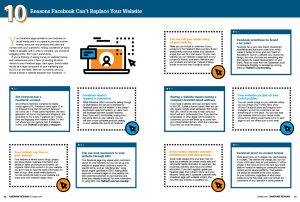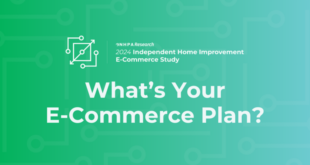Click the picture to download a PDF of this story.
Your Facebook page represents your business on social media, and it is a space to promote in-store events, announce new products and sales and connect with your customers. Having a presence on social media is valuable, and in order to compete, you should be engaging online. But it can’t stand alone.
If you’re thinking of saving money on website hosting and maintenance costs in favor of sending all online visitors to your Facebook page, think again. Social media should be a large component of your marketing plan, but it’s just one facet. Here are 10 reasons why you should maintain a website separate from Facebook.
1. Not everyone has a Facebook account.
According to statistics compiled by digital media agency ISL, Facebook users ages 13 to 24 dropped more than 50 percent between 2014 and 2017. These users represent the next generation of home improvement shoppers, and according to ISL’s data, Facebook isn’t where they are engaging with retailers online. Click here to find out where you can capture Gen Z shoppers online.
2. Facebook doesn’t support e-commerce.
While Facebook offers community selling through its Marketplace, the service is intended for Facebook users and not retailers. It also doesn’t incorporate a payment system, so users must still exchange payment outside Facebook. Even if you aren’t comfortable jumping into a full online store on your website, you can still host a more complete products catalog on your website than can fit on Facebook.
3. Your content can live on your website.
Your website is where how-to blogs, project and store photos, business information and details on sales, promotions and events can originate. When that content is on your website, you don’t have to input the same information on each of your other social media platforms. You can simply link back to your website and boost your own website’s page views.
4. You can lead customers to your website through SEO.
Your Facebook page may appear when customers search for your business, but you can set up your website to appear when customers search for specific terms, such as “plumbing tips,” using search engine optimization (SEO). Adding these keywords to relevant pages on your website can draw potential customers to your business and boost your website’s ranking. For more information on using SEO click here.
5. You can tell your whole story on your website.
While you can include an overview of your company in the Facebook About section, there’s undoubtedly more that makes your operation unique than can fit in that space. On your own website, you can dedicate a page each to your company’s history, your team members and your products and services, instead of being limited to the few lines Facebook allows.
6. Facebook prioritizes its brand over yours.
Facebook has a very clear brand: streamlined newsfeeds and that iconic cyber blue, which makes it harder to show your own brand on the platform. But on a website, you choose the design, the color, the tone and everything else that creates the overall representation of your brand. Click here to read our story from the September issue of Hardware Retailing on developing a strong brand.
7. Having a website means having a company-branded email address.
If you have a website with your company name in the URL, (called a domain name), then you can also create multiple email addresses that include that URL, which is one way to help unify your brand and set a professional tone. If you send an e-newsletter or other digital communication to customers, you can set those up to come from your store-branded domain, which lets customers know they can trust the source.
8. Your website can link all your social profiles.
You can create a page on your website where you can embed your Twitter feed, show off your Facebook posts and snapshot your Instagram account so customers can see everything all in one place. You can also lead your website visitors to your social media accounts by adding social media icons to each page so you are always just a click away.
9. Social media requires constant maintenance and engagement.
Social media requires time your team may not have, but a website can remain mostly static and still provide helpful information to customers, like a business overview, store hours and contact information. If you don’t regularly update your Facebook page, then it doesn’t show up in your followers’ feeds, and if a potential customer visits a Facebook page with outdated content, they may think your business is outdated, too.
10. Facebook won’t be around forever.
Think about how—or if—people may use Facebook in 10 years. The internet will change, too, but if all of your information lives on your website, it will be simpler in the future to link to the next new social platform instead of needing to continually recreate content across several platforms. Your website will always be available at the same location for your customers, regardless of what social media accounts they have, and it can remain the cornerstone of your operation’s online presence.
 Hardware Retailing The Industry's Source for Insights and Information
Hardware Retailing The Industry's Source for Insights and Information









